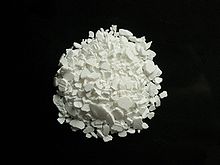
Caking is a powder's tendency to form lumps or masses. The formation of lumps interferes with packaging, transport, flowability, and consumption.[1][2] Usually caking is undesirable, but it is useful when pressing powdered substances into pills or briquettes. Granular materials can also be subject to caking, particularly those that are hygroscopic such as salt, sugar, and many chemical fertilizers. Anticaking agents are commonly added to control caking.
Caking properties must be considered when designing and constructing bulk material handling equipment. Powdered substances that need to be stored, and flow smoothly at some time in the future, are often pelletized or made into pills.
- ^ Cite error: The named reference
PTwas invoked but never defined (see the help page). - ^ Lück, Erich; von Rymon Lipinski, Gert-Wolfhard (2000). "Foods, 3. Food Additives". Ullmann's Encyclopedia of Industrial Chemistry. doi:10.1002/14356007.a11_561. ISBN 978-3-527-30385-4.